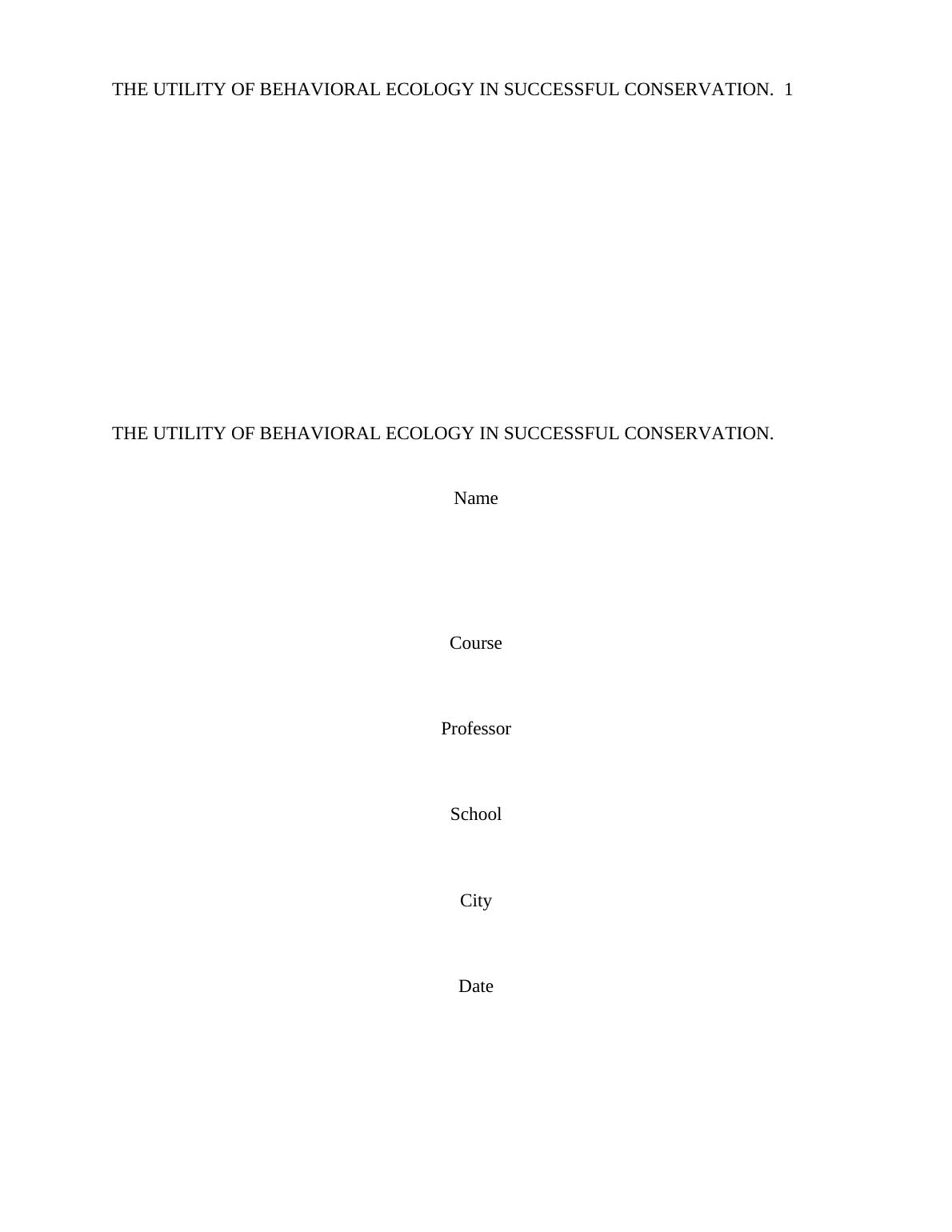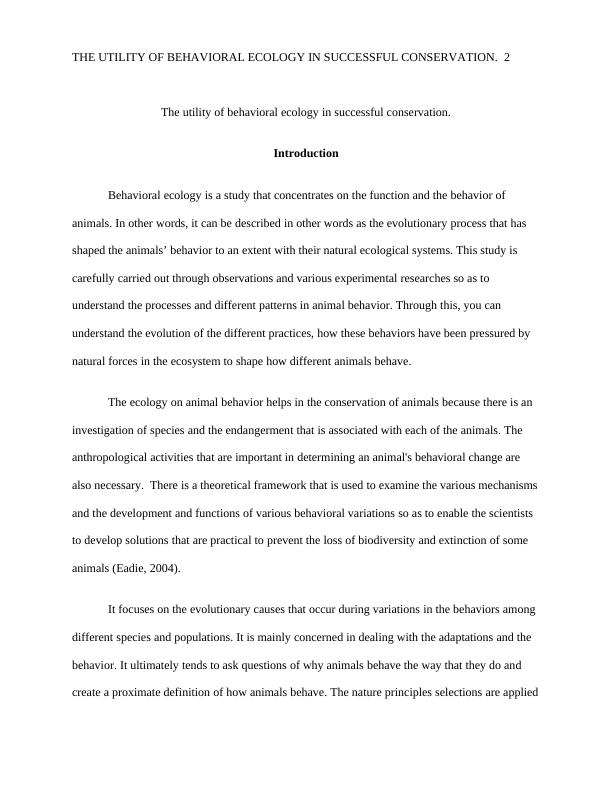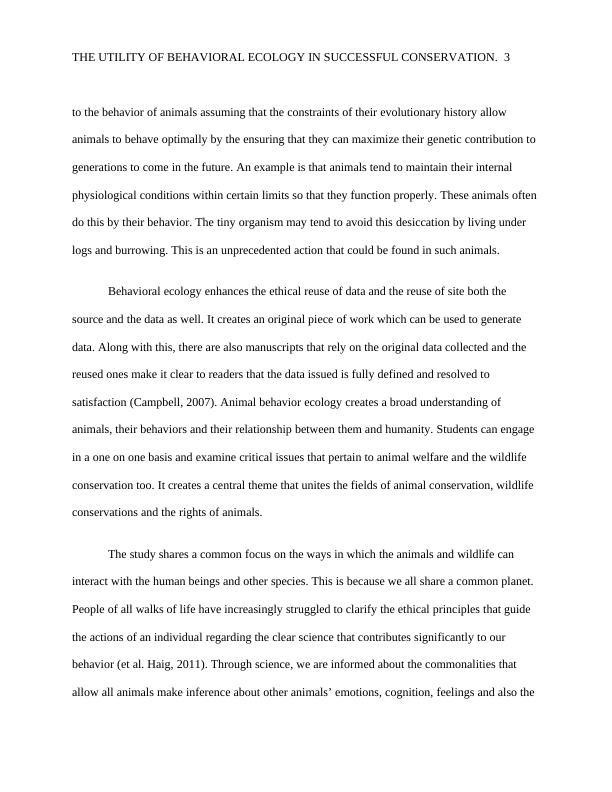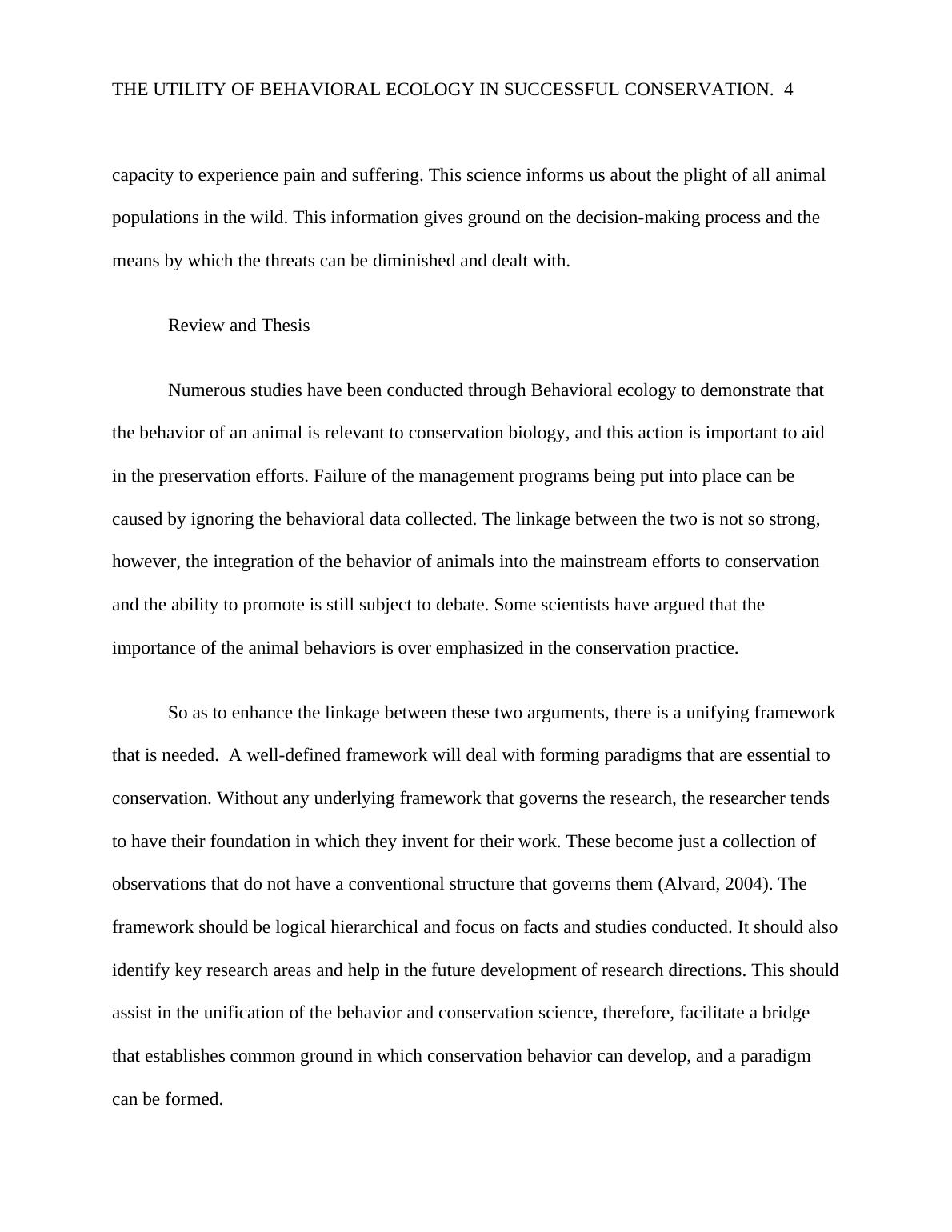Ask a question from expert
Behavioral Ecology Or Evolutionary Process | Study
12 Pages2977 Words318 Views
Added on 2020-02-05
Behavioral Ecology Or Evolutionary Process | Study
Added on 2020-02-05
BookmarkShareRelated Documents
THE UTILITY OF BEHAVIORAL ECOLOGY IN SUCCESSFUL CONSERVATION.1THE UTILITY OF BEHAVIORAL ECOLOGY IN SUCCESSFUL CONSERVATION.NameCourseProfessorSchoolCityDate

THE UTILITY OF BEHAVIORAL ECOLOGY IN SUCCESSFUL CONSERVATION.2The utility of behavioral ecology in successful conservation.IntroductionBehavioral ecology is a study that concentrates on the function and the behavior of animals. In other words, it can be described in other words as the evolutionary process that has shaped the animals’ behavior to an extent with their natural ecological systems. This study is carefully carried out through observations and various experimental researches so as to understand the processes and different patterns in animal behavior. Through this, you can understand the evolution of the different practices, how these behaviors have been pressured by natural forces in the ecosystem to shape how different animals behave. The ecology on animal behavior helps in the conservation of animals because there is an investigation of species and the endangerment that is associated with each of the animals. The anthropological activities that are important in determining an animal's behavioral change are also necessary. There is a theoretical framework that is used to examine the various mechanismsand the development and functions of various behavioral variations so as to enable the scientists to develop solutions that are practical to prevent the loss of biodiversity and extinction of some animals (Eadie, 2004).It focuses on the evolutionary causes that occur during variations in the behaviors among different species and populations. It is mainly concerned in dealing with the adaptations and the behavior. It ultimately tends to ask questions of why animals behave the way that they do and create a proximate definition of how animals behave. The nature principles selections are applied

THE UTILITY OF BEHAVIORAL ECOLOGY IN SUCCESSFUL CONSERVATION.3to the behavior of animals assuming that the constraints of their evolutionary history allow animals to behave optimally by the ensuring that they can maximize their genetic contribution to generations to come in the future. An example is that animals tend to maintain their internal physiological conditions within certain limits so that they function properly. These animals often do this by their behavior. The tiny organism may tend to avoid this desiccation by living under logs and burrowing. This is an unprecedented action that could be found in such animals.Behavioral ecology enhances the ethical reuse of data and the reuse of site both the source and the data as well. It creates an original piece of work which can be used to generate data. Along with this, there are also manuscripts that rely on the original data collected and the reused ones make it clear to readers that the data issued is fully defined and resolved to satisfaction (Campbell, 2007). Animal behavior ecology creates a broad understanding of animals, their behaviors and their relationship between them and humanity. Students can engage in a one on one basis and examine critical issues that pertain to animal welfare and the wildlife conservation too. It creates a central theme that unites the fields of animal conservation, wildlife conservations and the rights of animals. The study shares a common focus on the ways in which the animals and wildlife can interact with the human beings and other species. This is because we all share a common planet. People of all walks of life have increasingly struggled to clarify the ethical principles that guide the actions of an individual regarding the clear science that contributes significantly to our behavior (et al. Haig, 2011). Through science, we are informed about the commonalities that allow all animals make inference about other animals’ emotions, cognition, feelings and also the

THE UTILITY OF BEHAVIORAL ECOLOGY IN SUCCESSFUL CONSERVATION.4capacity to experience pain and suffering. This science informs us about the plight of all animal populations in the wild. This information gives ground on the decision-making process and the means by which the threats can be diminished and dealt with.Review and ThesisNumerous studies have been conducted through Behavioral ecology to demonstrate that the behavior of an animal is relevant to conservation biology, and this action is important to aid in the preservation efforts. Failure of the management programs being put into place can be caused by ignoring the behavioral data collected. The linkage between the two is not so strong, however, the integration of the behavior of animals into the mainstream efforts to conservation and the ability to promote is still subject to debate. Some scientists have argued that the importance of the animal behaviors is over emphasized in the conservation practice.So as to enhance the linkage between these two arguments, there is a unifying frameworkthat is needed. A well-defined framework will deal with forming paradigms that are essential to conservation. Without any underlying framework that governs the research, the researcher tends to have their foundation in which they invent for their work. These become just a collection of observations that do not have a conventional structure that governs them (Alvard, 2004). The framework should be logical hierarchical and focus on facts and studies conducted. It should alsoidentify key research areas and help in the future development of research directions. This shouldassist in the unification of the behavior and conservation science, therefore, facilitate a bridge that establishes common ground in which conservation behavior can develop, and a paradigm can be formed.

End of preview
Want to access all the pages? Upload your documents or become a member.
Related Documents
Natural Selection and Immunological Differences in Specieslg...
|8
|2304
|43
Community Disassembly in Ephemeral Ecosystemslg...
|26
|7503
|40
Anthropology - Definition, Evolution, and Investigative Brancheslg...
|6
|1369
|236
Theorists and Learning Theories Assignmentlg...
|4
|789
|19